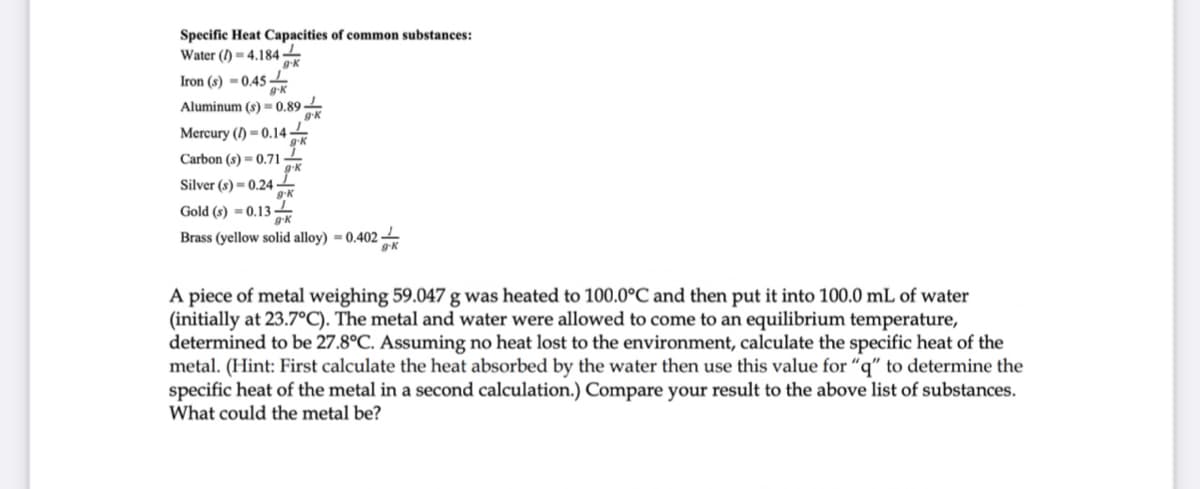Specific Heat Capacities of common substances: Water (1) = 4.184 Iron (s) =0.45L Aluminum (s) = 0.89 L Mercury () = 0.14 Carbon (s) = 0.71 g-K Silver (s) = 0.24 - Gold (s) = 0.13L Brass (yellow solid alloy) = 0.402 - A piece of metal weighing 59.047 g was heated to 100.0°C and then put it into 100.0 mL of water (initially at 23.7°C). The metal and water were allowed to come to an equilibrium temperature, determined to be 27.8°C. Assuming no heat lost to the environment, calculate the specific heat of the metal. (Hint: First calculate the heat absorbed by the water then use this value for "q" to determine the specific heat of the metal in a second calculation.) Compare your result to the above list of substances. What could the metal be?
Specific Heat Capacities of common substances: Water (1) = 4.184 Iron (s) =0.45L Aluminum (s) = 0.89 L Mercury () = 0.14 Carbon (s) = 0.71 g-K Silver (s) = 0.24 - Gold (s) = 0.13L Brass (yellow solid alloy) = 0.402 - A piece of metal weighing 59.047 g was heated to 100.0°C and then put it into 100.0 mL of water (initially at 23.7°C). The metal and water were allowed to come to an equilibrium temperature, determined to be 27.8°C. Assuming no heat lost to the environment, calculate the specific heat of the metal. (Hint: First calculate the heat absorbed by the water then use this value for "q" to determine the specific heat of the metal in a second calculation.) Compare your result to the above list of substances. What could the metal be?
General Chemistry - Standalone book (MindTap Course List)
11th Edition
ISBN:9781305580343
Author:Steven D. Gammon, Ebbing, Darrell Ebbing, Steven D., Darrell; Gammon, Darrell Ebbing; Steven D. Gammon, Darrell D.; Gammon, Ebbing; Steven D. Gammon; Darrell
Publisher:Steven D. Gammon, Ebbing, Darrell Ebbing, Steven D., Darrell; Gammon, Darrell Ebbing; Steven D. Gammon, Darrell D.; Gammon, Ebbing; Steven D. Gammon; Darrell
Chapter6: Thermochemisty
Section: Chapter Questions
Problem 6.144QP: A piece of iron was heated to 95.4C and dropped into a constant-pressure calorimeter containing 284...
Related questions
Question

Transcribed Image Text:Specific Heat Capacities of common substances:
Water () = 4.184-
Iron (s) - 0.45
Aluminum (s) = 0.89 -
g-K
Mercury (I) = 0.14-
Carbon (s) = 0.71-
Silver (s) = 0.24
g-K
Gold (s) = 0.13
Brass (yellow solid alloy) = 0.402 -
A piece of metal weighing 59.047 g was heated to 100.0°C and then put it into 100.0 mL of water
(initially at 23.7°C). The metal and water were allowed to come to an equilibrium temperature,
determined to be 27.8°C. Assuming no heat lost to the environment, calculate the specific heat of the
metal. (Hint: First calculate the heat absorbed by the water then use this value for “q" to determine the
specific heat of the metal in a second calculation.) Compare your result to the above list of substances.
What could the metal be?
Expert Solution
This question has been solved!
Explore an expertly crafted, step-by-step solution for a thorough understanding of key concepts.
This is a popular solution!
Trending now
This is a popular solution!
Step by step
Solved in 4 steps with 4 images

Knowledge Booster
Learn more about
Need a deep-dive on the concept behind this application? Look no further. Learn more about this topic, chemistry and related others by exploring similar questions and additional content below.Recommended textbooks for you

General Chemistry - Standalone book (MindTap Cour…
Chemistry
ISBN:
9781305580343
Author:
Steven D. Gammon, Ebbing, Darrell Ebbing, Steven D., Darrell; Gammon, Darrell Ebbing; Steven D. Gammon, Darrell D.; Gammon, Ebbing; Steven D. Gammon; Darrell
Publisher:
Cengage Learning

Chemistry: An Atoms First Approach
Chemistry
ISBN:
9781305079243
Author:
Steven S. Zumdahl, Susan A. Zumdahl
Publisher:
Cengage Learning

Chemistry & Chemical Reactivity
Chemistry
ISBN:
9781133949640
Author:
John C. Kotz, Paul M. Treichel, John Townsend, David Treichel
Publisher:
Cengage Learning

General Chemistry - Standalone book (MindTap Cour…
Chemistry
ISBN:
9781305580343
Author:
Steven D. Gammon, Ebbing, Darrell Ebbing, Steven D., Darrell; Gammon, Darrell Ebbing; Steven D. Gammon, Darrell D.; Gammon, Ebbing; Steven D. Gammon; Darrell
Publisher:
Cengage Learning

Chemistry: An Atoms First Approach
Chemistry
ISBN:
9781305079243
Author:
Steven S. Zumdahl, Susan A. Zumdahl
Publisher:
Cengage Learning

Chemistry & Chemical Reactivity
Chemistry
ISBN:
9781133949640
Author:
John C. Kotz, Paul M. Treichel, John Townsend, David Treichel
Publisher:
Cengage Learning

Chemistry & Chemical Reactivity
Chemistry
ISBN:
9781337399074
Author:
John C. Kotz, Paul M. Treichel, John Townsend, David Treichel
Publisher:
Cengage Learning

Chemistry
Chemistry
ISBN:
9781305957404
Author:
Steven S. Zumdahl, Susan A. Zumdahl, Donald J. DeCoste
Publisher:
Cengage Learning
